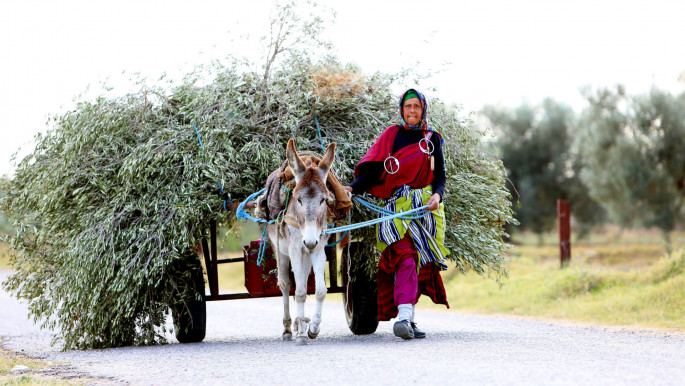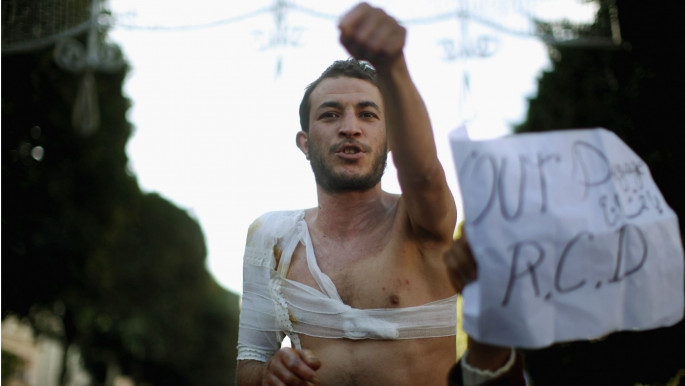Tunisia ousts Ben Ali: Special anniversary coverage
Four years ago today, after weeks of mass protest, the dictator of Tunisia gave up his grip on power and fled for his life.
5 min read
Leaving on a jet plane: Ben Ali fled to Saudi Arabia in 2011 [al-Araby]
The protests had started with one man.
On December 17, Mohamed Bouazizi - a humble fruit seller in the quiet town of Sidi Bouzeid - found he could take no more of the daily humiliations he faced at the hands of the state apparatus, and ended his life.
Clutching a can of petrol, he stood outside the governor's offices in his home town. On that cold December morning, four years ago, he poured the fuel over his body and struck a match.
Thousands turned out to mourn at his funeral the following day. They were to carry his fire across the region, igniting smouldering tensions, toppling dictators in some countries and leaving chaos in others.
Catch up with all of al-Araby al-Jadeed's special coverage of the fourth anniversary of the birth of the Arab Spring.
 |
 |
| Timeline Tunisia: Countdown to Revolution | Tunis conversations: Coffee, Om Kolthoum and the post-revolutionary landscape, by Raafat Majzoub |
| From the self-immolation of Mohamed Bouazizi to the election of Beji Caid Essebsi, Tunisia started the Arab Spring. It is also the only country close to a transition to democracy. | Read the first in our blog series focused on conversations on streets and in cafés across the region investigating Arab identity - who we are and who we would like to be. |
 |
 |
| Feature: The making and unmaking of a Tunisian Salafi, by Sandro Lutyens | Feature: The women behind Tunisia's revolution, by Basma Barakat |
| Since the revolution, Tunisian Salafis have enjoyed their freedom, and the community is growing. But under former autocrat Ben Ali, being a Salafi wasn’t easy. | Following the departure of Ben Ali from Tunisia, women have fought, not only to advance women's rights, but to build new freedoms for all citizens. |
 |
 |
| Analysis: Tunisia after 2011: The three lies that came undone, by Salah Eddine al-Jorashi | Comment: Still a long way to equality for Tunisian women, by Nessryne Jelalia |
| When Tunisian dictator Ben Ali fled the country on 14 January 2011, many commentators expected hell to break out. Instead, Tunisia has become a model for the region, searching for peace, democracy and equality. | Tunisia's revolution has secured increased freedom. But - whether on issues of violence, political representation or equal pay and opportunity - there is a lot of work to do on gender issues. |
 |
 |
| Feature: Jailing the bloggers who fuelled the Tunisian revolution, by Mohammad Maamari | Watch: Pirate radio, no police: Tunisia's revolution rumbles on |
| Many online writers and activists who supported the revolution are languishing behind bars, but there are others willing to continue the fight. | 'One big family' in Menzel Bouzaiane, where anarchy reigns successfully, central authority has no role - but unemployment threatens livelihoods. It is a pirate town, one of a handful and one whose inhabitants insist, at all times, on 'true justice'. |
 |
 |
| Comment: A rocky transition, by George Joffe | Comment: Burying Tunisia's past won't end the horrors, by Sayida Ounissi |
| The Ben Ali regime never succeeded in eliminating the Tunisian trade union movement or movements articulating popular protest over human rights and abuse of power. It was these very organisations that organised the demonstrations which destroyed the regime. | Tunisia needs to face up the ghosts of the past, if it wants to establish transitional justice and see an end to repression, says Tunisian MP Sayida Ounissi. |
 |
 |
 |
| Watch: Special documentary - Tunisia: The phosphate curse, directed by Yasmine Ryan | Analysis: Essebsi and Tunisia: The support of Ben Ali's elites | Analysis: Memories of Sidi Bouzeid by George Joffe |
| The miners of Gafsa have long faced injustice and oppression, leading the town to become a hotbed of revolutionary sentiment. Yet it remains neglected even as the country transitions to democracy. | In the first of a two-part series, we look at how Nidaa Tounes, with the help of the remnants of Ben Ali's regime, has built a political machine out of popular fears of political Islam. | Bouazizi’s act of self-immolation was a profound personal statement of despair. It also acted as a catalyst for the accumulated frustrations in the region. But transitions take time. We are only a short way in. |
 |
 |
 |
| Comment: Why Mohamed Bouazizi is blameless by Salama Abdul Hamid | Comment: Mario Buda's wagon vs Bouazizi's fruit cart by Malik Wannous | Feature: The town the revolution forgot by Sandro Lutyens |
| Mohamed Bouazizi's death may have been a catalyst for the Arab Spring, but the revolutions that followed had been brewing for years. | The greatest personal sacrifices have brought more political change to the Arab world than car bombs and terrorism ever could. | Sidi Bouzid may be the cradle of the Arab Spring. But denizens are caught between the glorious revolution and today's economic grievances. |
 |
 |
 |
| Analysis: Marzouki prepares for kick-off in the presidential final by Salah Eddin al-Jorashi | Feature: Family remember struggle of Mohamed Bouazizi by Basma Barakat | News: Ennahdha asks supporters to select 'most competent president' |
| The interim president is enjoying strong popular support as he prepares to face Beji Caid Essebsi in the second half of Tunisia's presidential elections. | Mohamed Bouazizi set fire to himself on 17 December 2010 in protest at oppression. His family remember him four years on as a man who was trying his best to feed his family. | The "moderate Islamist" movement was expected to play kingmaker in the final round of Tunisia's presidential election, but has decided not to officially endorse either candidate. |







